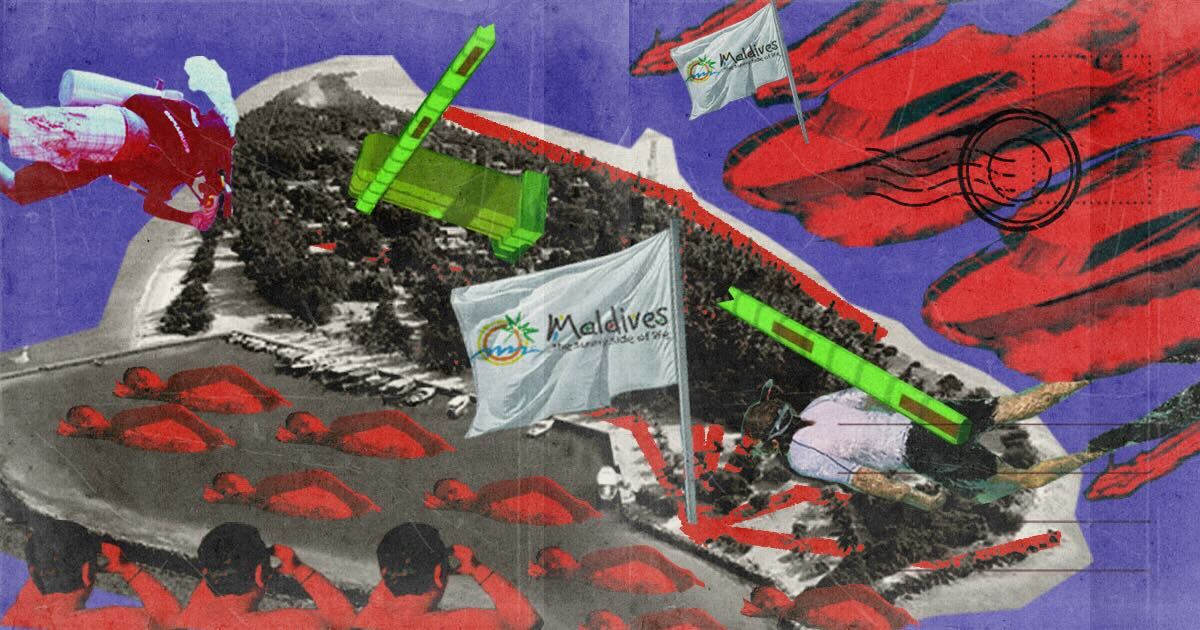Surf wars: Maldives councils challenge tourism control of natural resources
Resorts no longer enjoy unrestricted access to dive sites and surf spots.

Artwork: Dosain
03 Apr 2025, 13:25
The resort was cutting “all business ties” to their island, the manager informed staff. No more day trips with tourists. No more supply contracts with fishermen and traders.
The announcement was made after the high-end property's manager gathered all employees from the neighbouring island. The boycott was retaliation for their island council’s plans to charge user fees for a surf spot, a popular destination for the resort's guests.
The incident occurred in late 2022, two years after the previous administration granted councils wider authority to manage natural resources within an island’s jurisdiction. In an abrupt shift, luxury resorts that previously enjoyed unrestricted access to dive sites, surf spots and sandbanks – which they long considered their uncontested domain – found some of the prime locations fell within an inhabited island’s boundaries.
The dispute in question was resolved when the council agreed to delay implementation and the resort resumed normal relations. But in a country where most tourists stay in exclusive private-island resorts, many operators have since struggled to accept the unprecedented leverage of inhabited islands over their beaches and waves.
“I feel the purpose of allocating jurisdiction of islands was to ensure they benefit from the resources available to them. It is the regulatory authorities' mandate to ensure that local councils do not exploit their powers, while facilitating avenues for financial sustainability,” Afshan Latheef, the former CEO of the Local Government Authority, told the Maldives Independent, noting “concerns about the possibility of uncontrolled and unreasonable taxes” prompted by the new powers.
Afshan led the LGA when the landmark amendments to the decentralisation law in 2019 triggered "resource use conflicts" between tourism businesses and local councils. In the most recent case, the Dhigurah council’s president came under fire for confronting tourists over the use of the island's famous beach without permission.
The Dhigurah council imposed fees to cover the growing costs of collecting waste and managing the 5km stretch of beach, the island council president told Maldives Independent. But critics questioned the lack of communication with tourism stakeholders and the enactment of the council’s rules.
Local pushback
“There are very few [resources] available for a local community. Tourism-related activities offer one of the few ways to generate revenue. Councils should be able to take user fees if a community resource is being used,” Salma Fikry, a longtime advocate for decentralised administration, told the Maldives Independent.
“Tourism operators must not think they can just use it for free and pocket a profit off these resources. If it's an issue with trust over how the money is used, they should discuss and make it better. These resources are not just for them to get rich, it belongs to the whole community. It has to go back to the community.”
Salma suggested that there was a condescending attitude among resort operators, “a sort of dissonance that creeps in when a small local council says we will charge a fee for using this area. Because for all this time, the resources in islands were a free-for-all for the powerful people.”
But objection to council rules has also come from smaller tourism businesses within island communities.
When the Fuvahmulah City Council attempted to regulate the use of marine resources two years ago, the move was met with an immediate and fierce resistance from the island’s diving community.
The regulation introduced in June 2023 included guidelines for the registration of dive centres and dive schools, issuance of permits for diving activities as well as speeding limits and rules for anchoring and carrying capacity. Most controversially, the council imposed fees for diving with higher rates for foreign vessels, safaris and liveaboards from other parts of the country. A lower rate was proposed for dive schools based in Fuvahmulah.
But local divers staged protests inside the city council offices, forcing delayed implementation pending discussions with stakeholders.
In the wake of the Dhigurah incident last month, guesthouse operators from Maafushi – an island in the neighbouring Kaafu atoll famous for pioneering local tourism – echoed the opposition to levying such fees. Any tourist should be able to "go to any island they want, disembark, and swim in the waters of that island," Ahmed Waheed, the vice president of the Guesthouse Association, told Vaguthu.
An excursion guide from Maafushi who spoke to the Maldives Independent criticised the Vaavu Fulidhoo council’s new fee for watching stingrays at the beach.
“There’s a queue there but there’s no seating arrangement, there’s no facilities for the tourists apart from this one very bad toilet, so where does the money go, what’s the whole point? If some people are paying a fee to have an excursion or have an experience, you at least need to develop that further," he suggested.
Regulatory hurdles
The Dhigurah, Fuvahmulah and Fulidhoo councils were exercising extended powers granted under the revised Decentralisation Act to “use and manage the natural resources such as the reef and lagoon within the council's jurisdiction."
While the provision allowed councils to impose fees and permits, the enactment of a legally binding regulation is a painstakingly slow process that involves submission to the Local Government Authority and approval from the Attorney General’s Office.
The Laamu Hithadhoo island council has been awaiting approval for rules devised nearly two years ago to regulate a dive spot. Known as Baaneykolhu, which sits on a channel opening, the spot is a critical habitat for manta rays, turtles and groupers. It is especially popular among divers staying at the Six Senses Laamu resort, located just five minutes away.
Recognising the importance of the natural asset, the Hithadhoo council created a management plan in 2023 along with an accompanying regulation that proposed visitor fees to raise finances for management. Learning from the experience of the Fuvahmulah council, the Hithadhoo council conducted extensive consultations with the local community, fishermen, nearby resorts and other tourism stakeholders. An acceptable fee was negotiated between the parties.
Ibrahim Shammoon, president of the Hithadhoo council, expressed frustration with the pace of the central government in Malé.
“With our community conservation area, all the state institutions are saying yes, no one has said no to all the work we have done. But we still haven’t been able to gazette it. This is the reason that Dhigurah council also have to make policies [usoolu] instead of a regulation [gavaidhu],” he told the Maldives Independent.
“But almost all of our five-year term is finishing with that project getting dragged on. The government has changed, but we still haven’t gotten it gazetted. So making a regulation is a very hard thing. But regulating such an area, free of charge, is not possible. It would be an expense for the council, just to facilitate and run the businesses of the private sector. So, councils do need to take a charge for it.”
In the Maldives, the “be all and end all” is the Malé government, which has been reluctant to hand over ownership or authority to other islands, Salma Fikry observed.
She acknowledged a common complaint concerning corruption but suggested that there were "mechanisms to address that and to improve that."
"Just because it is a council, you cannot say that they will take the money and use it for their own benefit," she said. "If so, fees shouldn't be paid at any level of government. At the national level corruption is much higher.”
Discussion
No comments yet. Be the first to share your thoughts!
No comments yet. Be the first to join the conversation!
Join the Conversation
Sign in to share your thoughts under an alias and take part in the discussion. Independent journalism thrives on open, respectful debate — your voice matters.




